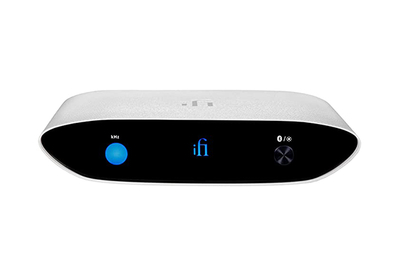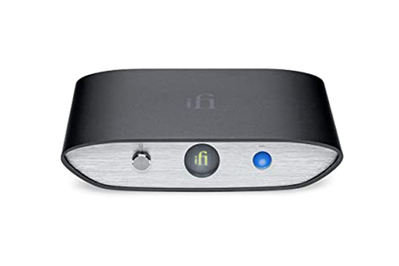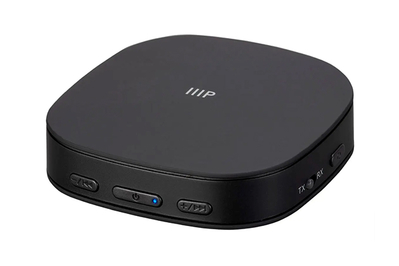
These days most mainstream audio electronics have Bluetooth connectivity built in. But if you have older home-audio gear, such as a beloved stereo receiver or a set of powered speakers, there’s a chance that either it lacks Bluetooth connectivity altogether or its Bluetooth reception is poor. That doesn’t mean you have to scrap your system and start over.
A Bluetooth audio receiver lets you pair your older gear with the latest Bluetooth audio sources—and the best ones give you great sound. The iFi Audio Zen Air Blue is our favorite due to its excellent range, exhaustive format support, and surprisingly good audio performance for the price.

This Bluetooth audio receiver sounds amazing, is simple to set up, and offers surprisingly good range—but it lacks digital audio outputs.

The Zen Blue V2 is a costly but worthwhile upgrade to our top pick if you prefer digital outputs or have a larger home that requires more signal range.
May be out of stock

If you’re looking for a cheap, reliable Bluetooth audio receiver with portable potential, the Monoprice 38071 performs well. But it has some quirks.
If you own—and still love—an older stereo audio system that lacks Bluetooth, a great-sounding Bluetooth audio receiver can modernize your system.
What matters mostThe best Bluetooth audio receiver supports the most advanced codecs and offers a high-quality digital-to-analog converter for the best sound.
How we testedWith each Bluetooth receiver, we tested the pairing and connection process, sound quality, signal range, and ease of use.
Brand-concealed testsWe did our best to conceal the receivers’ identities during our audio comparisons to help eliminate bias.

This Bluetooth audio receiver sounds amazing, is simple to set up, and offers surprisingly good range—but it lacks digital audio outputs.
Although you can certainly pay more for a Bluetooth receiver to get additional features and even longer range, the iFi Audio Zen Air Blue delivers where it matters most. The sound quality is on a par with that of Bluetooth audio receivers costing nearly twice as much, and its small number of connections and controls makes it easy and intuitive to operate. Plus, the Bluetooth range is surprisingly good considering this model’s lack of an external antenna.
Stereo analog RCA outputs are the only connection option, and that’s fine for most people since pretty much every home stereo system has an analog input. The Zen Air Blue supports all of the relevant Bluetooth audio codecs (coder/decoders, algorithms that compress audio data to make it easier to transmit wirelessly), so it’s almost certainly capable of receiving the best Bluetooth signal that your phone, tablet, or computer is capable of transmitting.

The Zen Blue V2 is a costly but worthwhile upgrade to our top pick if you prefer digital outputs or have a larger home that requires more signal range.
May be out of stock
If you have a high-end audio system or would prefer a Bluetooth audio receiver with digital audio outputs, the iFi Audio Zen Blue V2 was without question the best-sounding Bluetooth receiver we evaluated in our latest round of tests. Connection-wise, it has you covered with both optical and coaxial digital audio outputs, as well as a 4.4 mm balanced audio connection and stereo analog RCA outputs.
The Zen Blue V2 is also a great choice if you need more signal range than most Bluetooth receivers can provide. All the rest of our test units either became unstable or lost connection somewhere within the 1,518-square-foot suburban home in which we did our testing, but the Zen Blue V2, fitted with the supplied long-range antenna, maintained a stable connection from an iPhone located all the way in the far corner of the backyard.
Combine that with easy setup, reliable and near-instantaneous reconnections, and an attractive form, and the Zen Blue V2 is the best pick for demanding audiophiles, despite its lofty price tag.

If you’re looking for a cheap, reliable Bluetooth audio receiver with portable potential, the Monoprice 38071 performs well. But it has some quirks.
If your main priorities when shopping for a Bluetooth receiver are price and portability, as opposed to ergonomics and pristine sound quality, the Monoprice 38071 Premium Bluetooth 5 Transmitter and Receiver wins out over other comparably priced offerings. It supports the most common Bluetooth audio codecs but lacks support for a couple of the more esoteric ones that audiophiles may appreciate.
The 38071 can function as a Bluetooth receiver or transmitter, though we tested only its reception capabilities for the purposes of this guide. In addition, you can either leave it connected to power or use it as a portable device, as it has pretty decent battery life. It also has transport controls that allow you to skip tracks without unlocking your phone or other portable media player.
Unfortunately, it has some operational quirks that appear to be common for models in its price class and make it less intuitive than the iFi Audio picks. But as long as you’re using its optical output instead of its 3.5 mm analog output, the sound quality is pretty solid.
I’ve been reviewing AV equipment for two decades and am currently the editor of SoundStage Access, a publication dedicated to high-value audio and tips and tricks for budding audiophiles. Over the years, I’ve tested and reviewed more audio receivers, preamps, and amplifiers than I care to count.
The person who needs a Bluetooth audio receiver most likely fits into one of two categories: someone who owns a beloved but older stereo system, computer speaker set, or soundbar that lacks a Bluetooth connection, or someone who wants to upgrade the Bluetooth connectivity of their system to add support for more advanced Bluetooth codecs like AAC, aptX, aptX Adaptive, aptX HD, aptX LL, LDAC, and LHDC/HWA. (We’ll discuss what these codecs are and what they mean for performance in the next section.)
If you’re in either of those groups, sound quality is probably your number one priority. Beyond that, real-world indoor signal range—as well as the ability to receive a signal through multiple walls or in the presence of other radio-frequency devices like Wi-Fi routers and smart-home appliances—is likely more important than portability or price.
If you’re looking for something more portable, we have other guides for you. If you want a small, cheap, portable Bluetooth audio receiver to use in the car or with an inexpensive pair of wired headphones, check out our guide to the best Bluetooth headphone adapter. If you value both portability and high-quality audio performance, a USB-based portable headphone amp/DAC may be a better choice than a Bluetooth receiver.

If you want to use your favorite wired headphones over a wireless connection, the easy-to-use 1Mii ML100 is the best Bluetooth headphone adapter for most people.

The affordable Fosi Audio DS1 is our favorite headphone amp/DAC because it has the needed connections and power output to suit most headphones.

For this guide, we looked for Bluetooth audio receivers that clearly stated their supported Bluetooth codecs, could be powered by a wall plug, and had some applicability in a home stereo system, not merely a portable setup.
We put a high priority on which Bluetooth codecs each receiver supported. Since the most affordable model we definitely intended to test (the $40 Monoprice 38071) supports the AAC, aptX, aptX HD, and aptX Low Latency codecs, there was simply no excuse for more expensive models to omit those formats. For pricier Bluetooth receivers, we also gave preference to those that supported more advanced but less common codecs like LDAC and LHDC/HWA. This criterion eliminated a lot of potential competitors.
What are Bluetooth codecs, and why do they matter? You can get the full answer to that question in Brent Butterworth’s article “What You Really Need to Know About Bluetooth Audio.” In short, codecs are algorithms that compress audio data so that it’s easier to transmit wirelessly. All Bluetooth devices support low complexity subband codec (SBC), a low-bandwidth codec that doesn’t require much processing power. These days, almost all devices that can transmit a Bluetooth signal rely on more sophisticated codecs that offer some combination of lower latency, higher resolution, or higher fidelity. iOS devices like iPhones and iPads employ the AAC codec if the option is available, and many Android devices support some variation of aptX. Sony phones and portable media players rely on LDAC for a higher-quality wireless connection, and newer Huawei mobile devices use a similar codec called LHDC/HWA.
In practice, we found that the quality of the Bluetooth receiver and its digital-to-analog converter had far more impact on sound quality than did the codec, although we didn’t have any aptX Adaptive, LDAC, or LHDC sources to test with. Still, there’s no reason for you not to use the best codec your device is capable of transmitting, and better codec support generally indicates newer and better chip design and implementation.
We also preferred receivers that supported Bluetooth 5.0 or better, due to its higher speed, higher bandwidth, and extended range.